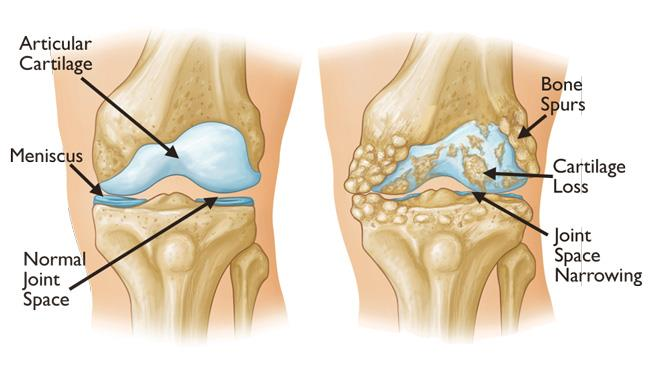A nurse is educating a client who has osteoarthritis of the knee. Which of the following explanations should the nurse give to the client as part of the disease process?
Damage to cartilage and bone can progressively worsen.
Organ failure in later stages may occur without treatment.
Inflammation will resolve over time.
There will be periods of flare-ups and remission of symptoms.
The Correct Answer is A
Choice A reason: Damage to cartilage and bone can progressively worsen. This is a characteristic of osteoarthritis. The disease is a degenerative joint disease that results in the loss of cartilage, which cushions the ends of bones in joints. As the disease progresses, the cartilage becomes thinner and may wear away entirely, causing the bones to rub against each other. This can result in pain, stiffness, and loss of joint movement.
Choice B reason:
Organ failure in later stages may occur without treatment. This statement is not typically associated with osteoarthritis. While osteoarthritis can significantly impact a person's quality of life, it does not directly cause organ failure. However, it's important to manage osteoarthritis effectively to maintain overall health and prevent secondary complications.
Choice C reason:
Inflammation will resolve over time. This is not typically true for osteoarthritis. While some people with osteoarthritis may experience periods of reduced symptoms, the underlying disease process does not resolve over time. In fact, osteoarthritis usually worsens over time.
Choice D reason:
There will be periods of flare-ups and remission of symptoms. This is true for many people with osteoarthritis. Symptoms can vary and may become more severe during periods of activity or stress on the joint. Conversely, symptoms may decrease during periods of rest or with effective management strategies.

Nursing Test Bank
Naxlex Comprehensive Predictor Exams
Related Questions
Correct Answer is D
Explanation
Choice A reason:
Hyperplasia is an increase in the number of cells in an organ or tissue, which can lead to its enlargement. While hyperplasia can be a response to a stimulus and is not necessarily precancerous, it does not describe the abnormal changes in the shape, size, and organization of mature cells.
Choice B reason:
Metaplasia is a reversible change in which one differentiated cell type is replaced by another cell type. This process can be a response to chronic irritation and inflammation, and while it may predispose cells to cancerous changes, it is not in itself a precancerous condition.
Choice C reason:
The term 'malignant' refers to cancerous cells that have the ability to invade and destroy nearby tissue and spread to other parts of the body. The description of the cells as 'moderately abnormal' does not indicate that the cells are malignant but rather that they are showing signs of potentially precancerous changes.
Choice D reason:
Dysplasia refers to the presence of abnormal cells within a tissue or organ. It is characterized by changes in cell size, shape, uniformity, arrangement, and structure, particularly when such changes are strongly suggestive of developing neoplasia, or new, abnormal growth. In the context of a Pap smear, dysplasia is indicative of precancerous changes and is the term used to describe the abnormal development of cells on the cervix.
Correct Answer is B
Explanation
Choice A reason:
The Mantoux test, also known as the tuberculin skin test, is used to detect latent TB infection but is not the most reliable for confirming active pulmonary TB. It can indicate if someone has been infected with TB bacteria, but it cannot differentiate between latent and active TB.
Choice B reason:
A sputum culture for acid-fast bacillus is the gold standard for diagnosing active pulmonary TB. It involves culturing a sample of sputum (phlegm) to see if TB bacteria grow, which confirms the diagnosis. This test is the most definitive and reliable method, although it may take several weeks to obtain results.
Choice C reason:
A sputum smear can detect TB bacteria in sputum samples quickly, but it is less sensitive than a culture. It can miss cases, especially if the bacterial load is low. Therefore, while useful for initial screening, it is not as reliable as a culture for confirming active TB.
Choice D reason:
A chest x-ray can show signs suggestive of TB, such as infiltrates or cavities in the lungs, but it cannot confirm the presence of TB bacteria. It is a supportive diagnostic tool but not definitive for active TB diagnosis.
Whether you are a student looking to ace your exams or a practicing nurse seeking to enhance your expertise , our nursing education contents will empower you with the confidence and competence to make a difference in the lives of patients and become a respected leader in the healthcare field.
Visit Naxlex, invest in your future and unlock endless possibilities with our unparalleled nursing education contents today
Report Wrong Answer on the Current Question
Do you disagree with the answer? If yes, what is your expected answer? Explain.
Kindly be descriptive with the issue you are facing.
